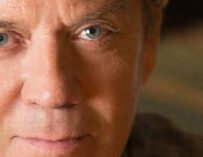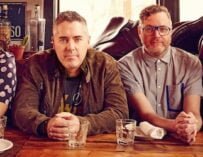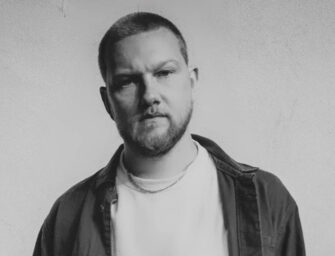
Wayne Hussey is currently touring his new solo album
With the gothic rock veteran’s new solo album just released, Songwriting catches up with him in his birthplace of Bristol
![]() ot many people can claim to be a veteran of three of the most iconic bands of the 1980s… but one man who can is Wayne Hussey, ex-Dead Or Alive, ex-Sisters Of Mercy and still very much the frontman of goth-rock heroes The Mission, an outfit whose famously loyal fanbase has enabled them to carry on touring and releasing albums even though the hits – let’s not forget The Mission had a string of 11 consecutive Top 40 singles in the 80s – may have stopped coming.
ot many people can claim to be a veteran of three of the most iconic bands of the 1980s… but one man who can is Wayne Hussey, ex-Dead Or Alive, ex-Sisters Of Mercy and still very much the frontman of goth-rock heroes The Mission, an outfit whose famously loyal fanbase has enabled them to carry on touring and releasing albums even though the hits – let’s not forget The Mission had a string of 11 consecutive Top 40 singles in the 80s – may have stopped coming.
But as Songwriting loiters outside Bristol Bierkeller at 4pm on a Tuesday afternoon, it’s not any of those bands we’re here to talk about. Instead, we’ve come to meet Wayne to discuss his new solo album, Songs Of Candlelight & Razorblades. The title may be decidedly Mission-esque, but the music within marks a change of direction for this Bristol-born musician, who escaped a strict religious upbringing and fled to immerse himself in the Liverpool punk scene back in the late 70s. Rock bombast is out, and acoustic guitars and gentle piano ballads are in!
There’s a change in Wayne, too. The flamboyant peacock of the 80s, plastered in make-up and seldom seen without his trademark hat, is now a soberly dressed 56-year-old – though the ever-present shades remain. And it’s not just the outfit that’s sober – where The Mission were once renowned for their industrial-level consumption of Blue Nun and various other substances, Wayne Hussey in 2014 is living a much cleaner, healthier lifestyle with his wife and two children in Sao Paulo, Brazil, where he spends most of his time simply making music.
So let’s talk about that.
 Let’s talk about Songs Of Candlelight & Razorblades first of all. Why a solo album, and why now?
Let’s talk about Songs Of Candlelight & Razorblades first of all. Why a solo album, and why now?
“Well, I always wanted to make a solo album. I made one five or six years ago, called Bare, but Bare was basically a collection of reworkings of lesser-known Mission songs and a couple of cover versions. I limited myself to a beatbox, an acoustic guitar and a piano, and that was it. So in my mind, it wasn’t really my first solo album… it was more of a side project.
“So this one… when I wrote the songs for the Mission album last year, I hit a rich vein and wrote, I don’t know, 24 or 25 songs in the space of four or five months. And of course we didn’t use them all, we used the ones that were more suitable, more rock-oriented. So I had some songs left over, and I didn’t really know what I was going to do with them. So I pondered it for a while – part of the process for me is just thinking about it for a little while, collating ideas and deciding what direction you want to go in.
“And once I thought about doing a solo album, I tried working on new stuff, but I couldn’t really find a way to do it, until I went back and completed the songs I’d demo’d for The Mission. Once I did that and got the vibe for it, the rest of it came really quickly. [Lead single] Wither On The Vine, for instance, came about just from plugging my Memory Man foot pedal in, that I hadn’t used for years, and immediately I had this 80s guitar sound and it was like, okay, let’s go with that vibe.
“And that was it, basically. There’s 14 songs on the album, basically collected over the past few years and then maybe five or six were written this year.”
It’s interesting you say you were “struggling to find a way in”, because you’ve been writing songs for 30-plus years…
“Yeah but it’s the same with any album. It’s the same with a Mission album: there’s always got to be some kind of way into it. As I said, part of the process for me is thinking about it, about what it should be. For example with the last Mission album, I thought the noise in the room when we played together was actually really good, and that’s what I wanted to capture, rather than track up millions of guitars and track the drums up separately from the bass and all that stuff. Which we’ve done in the past, but I wanted to get in the room together and capture that. And I think we did, largely, but it was… it’s a raw record, compared to previous ones, but that’s what it was.
“And the same thing with this album. Once I realised that there was no musical central theme, anything goes, it was easy! There’s a bit of country, there’s a bit of blues, there’s a bit of gospel, there’s a bit of jazz… you name it, it’s there. Although there’s no samba!”
Do you find though, after three decades of songwriting, that it gets easier or harder?
“Lyrics are always a pain… lyrics always take a little while to come. But I don’t think it gets easier or harder, I think you’ve just got to tap into that vein. Once you hit that vein, it’s like a fountain bursts forth and you’re away. It can take me months to find it, or it can take me a week.”
 Do you generally write for particular projects, or are you someone who writes constantly?
Do you generally write for particular projects, or are you someone who writes constantly?
“Well, I certainly don’t say ‘I’m sitting down to write a song’, that doesn’t work for me… you have to capture the idea when it comes, and you have to be aware that it might come at any time.
“There’s no hard and fast rules, there really isn’t. I have a studio at home in Brazil, and generally when I’m at home I will go into the studio and do some kind of work every day. Depending on how I feel or whether there’s a match on TV or whether my wife’s at home, depends how long I’ll stay in the studio. And I’ll come up with musical ideas: a drumbeat or a melody line or a groove or something… just stockpiling stuff. And then when I comes time to think about making a new record, I’ll listen through stuff and think, ‘Okay, that’ll work for this’.”
So you do most of your writing in your home studio these days?
“Pretty much… or in the house, I have a piano and guitars in the house too. One of my favourite things to do is sit there with a guitar while I’m watching TV, just strumming… that’s quite often how you find things, when you’re not really consciously thinking about it. Your mind’s focused on something else, whereas if you go in the studio with the purpose of writing, sometimes having that purpose can get in the way of actually doing it.”
What about the old days, when you didn’t have a house in Sao Paolo with a studio in it?
“Well I always had a little Portastudio, and I used to go away into the Black Mountains – well, I went there twice, actually, for the second and third Mission albums – to write. Rented a place, no TV, no telephone, no distractions, and just wrote with the Portastudio. And copious amounts of speed, which always seemed to aid the process back in those days!”
A lot of The Mission’s material was always credited as being co-written by the whole band… was that true or was it a ‘sharing royalties’ thing?
“It was a sharing royalties thing. I’ve been in bands where… how can I say this? Where somebody would take all the credit and do very little work. And so when I formed The Mission, my idea was to form a gang, everybody in it together. We didn’t split it up equally, what we did was we split the music four ways, 20 per cent each, and then 20 per cent extra for me who wrote the words. So it was 40:20:20:20, but what it did do was it made everybody feel part of it, it put me in a position where I could go in and say, ‘This is how it goes, this is the guitar line, this is the bassline, this is what I want the drums to do,’ OR I could go in and say, ‘I’ve got this, I’ve got no idea what to do with it!’. So it was a really good way to work, at that point in time.
So which do you prefer: writing alone or writing with other people?
“I’ve never really written with other people! I mean you sit there with acoustic guitars, but there’s always someone with a dominant idea. Certainly I’ve never written lyrics with anybody else. So I have to say I prefer writing on my own! [Laughs] But saying that, I like playing with other people… when you play in a room, something as if by alchemy appears out of the ether and you’re like, wow, that’s good. That happened with The Mission too, in rehearsals – songs would evolve quite naturally.”
Okay let’s talk about lyrics. Your lyrics have always tended towards the poetic and mystical…
“Yeah, well as I said the first two or three albums were always done on speed! So there was a tendency to be little more… oblique.”
Have you ever been tempted, though, to veer from that path?
“Yeah, I think the last couple of Mission albums have been a bit more pointed. I think the new album is, too. The new album’s probably the broadest, lyrically, that I’ve done. There’s a lot less songs these days about me and my dick, you know? [Laughs] And that’s kind of on purpose. There’s only so many songs you can write about your dick and what you do with it.”

The Mission in the 80s (Wayne is second from right)
What’s the best song you’ve written, do you think?
“Well, like everybody else I always think it’s the last thing I’ve written. And the last thing I finished for the album was Aporia, and lyrically and vocally that was very different for me. I wrote the words with no idea of a tune, so it didn’t have to conform to any kind of rhyme or meter… there are rhymes in it, but it doesn’t have that kind of meter you have when you’re ‘writing a song’, with a vocal melody and chords. It was just writing whatever came and then fitting it in, via spoken word, to the music.”
So you think you’re growing, as a songwriter?
“Well I’d like to think so! What’s the point of doing it if you’re not? Yeah, I think I am… but it’s a weird thing, the more you think you’re growing as a writer or an artist, the more you seem to be preaching to ever-decreasing circles. Because The Mission were pretty big in the 80s, and I think we were pretty good at what we did, but I look back at what we did then and there’s a lot of naivete in what we did, musically and certainly lyrically.”
Would you want to be back at that level again?
“In all honesty, no, not really. I would prefer life to be a little more comfortable than it is… I’d like to sell a few more albums, and I’d like to be able to play decent shows. I mean, this is about the right size for a solo show I think, but it would be nice to be able to do it with your own crew and stuff. I’ve got one guy with me, Graham, and he’s got a lot to do, poor man!
“In Brazil I still get recognised a lot more when I’m out in the streets and stuff than I do here, which always takes me by surprise, because it’s in the most weird places, usually!”
“I do feel very privileged to do what I do”
Is that a good thing, getting recognised?
“It is when it first happens! There are certain times, certain places you go… if I go to see a gig in Sao Paulo, for instance, then I would expect to get recognised. And when South Americans do it, they’re a bit more demonstrative and gushing. If I go to a gig here, people might recognise you but they’re a bit more, ‘Hunh!’, they won’t bother you. Over there it’s like, ‘Photograph! Photograph!’. If I go to a gig I kind of expect that, but I don’t expect it in the pet store. It makes me realise what a horrible mistress fame must be. Real fame, I mean. How does someone like Bono live their life? They can’t live a proper life… you just can’t go anywhere.”
“But that said, I can’t complain because I do feel very privileged to do what I do… there are times when it’s a pain in the arse but it could be a lot, lot worse. I could be working in a factory… I could have stayed working in the Co-Op! But being ‘Wayne Hussey’ is only a certain part of who I am, it’s like a job. You put this persona on to deal with certain situations
“It’s probably hard for some people to believe but I grew up as a very shy, very timid, scared of the world kind of kid. So as soon as any success came along, I lapped it up, and it all added to the persona.”

Wayne onstage at Bristol Bierkeller
Going back to the favourite song… apart from the last thing you’ve written, what one song should be played at your funeral?
“I’d have to say Tower Of Strength, because I think that song has touched people. So many people have told me they had that song for the first dance at their wedding! That’s probably the one that’s most popular with the fanbase, and I think really, when you think of The Mission, that song encapsulates everything good about what we were and what we are, which is big, brash, dramatic… the grand gesture, you know?”
What’s the worst song you’ve written, the one where you think, ‘I wish we hadn’t put that out’?
“Well… you don’t ever intentionally set out to make a crap record. But these things happen. I think there’s probably one on every album, apart from, I would say, God’s Own Medicine – I don’t think there’s anything weak on that album, personally. But all the other albums, I’d say there’s probably at least one song I’d probably skip… apart from the new album, but then ask me again in a year and there might be a skipper on there.”
What one song do you wish you’d written?
“Good question! Well on this tour I’ve just started playing Martha’s Harbour by All About Eve, and that’s a beautiful song, a really beautiful song. And I’ve also been playing The Killing Moon by Echo & The Bunnymen, which is another beautiful song.”
Can you remember what the first song you ever wrote was?
“Yes, in fact I was talking about this on BBC radio just this afternoon! Basically, I was a big T Rex fan, that’s how I got into making music, because suddenly I wanted to be a rock star instead of a footballer. And I got a guitar and a chord sheet, worked out a few chords, and I think the first song was basically A minor and you took that finger off and on, and it was called Seagull Woman, which is ripped off the lyrics of a T Rex song. I was about 13 or 14.
“Basically that’s the reason I started writing songs… because I couldn’t play anyone else’s!”
 So if T Rex inspired you to write songs in the first place, what songwriters do you most admire now?
So if T Rex inspired you to write songs in the first place, what songwriters do you most admire now?
“Well, besides the obvious Bob Dylan… I’ve come late to Dylan, really I’ve only gotten into Dylan in a big way in the last six to eight years. I always thought his songs were better covered, but I’ve grown to really appreciate his voice. I got to see him a couple of years ago in Sao Paulo and I absolutely loved it.
“I like Neil Young a lot as well. And I’ve really grown to love a lot of the old Delta blues as well, again it’s something I’ve come to late. Johnny Cash, I like… Leonard Cohen… you get the vibe.
“I just got a bit disenchanted with modern rock music, really. I started to find most of the new rock music I was hearing too generic. I blame Pro Tools, and the recording processes that are used. Because everyone uses Pro Tools – and quite rightly so, it’s great – but what it does do is neutralise your environment. Back in the days when everyone used tape, every studio had its own character. It’s actually getting better again now, but for a good few years, Pro Tools just made everything sound… digital.”
So what’s your studio at home like?
“It’s digital! [Laughs] I don’t use Pro Tools, I can’t afford it, I use Cubase, but I think they’re all much of a muchness really.”
So you haven’t got a big 64-track desk and loads of analogue outboard gear?
“No, no… I’ve got a Yamaha digital thing, very compact. But the thing about that desk is it’s very transparent: what you put in, you get out at the other end. The EQs on it and compression, I don’t use any of that, so you get out what you put in. I’ve got an old valve amp and compressors and a Neumann for the vocal chain, I’ve got a Fender Twin and Peavey there that I mic up and stuff.”
So… with 30 years plus in the game, do you see a point coming where you’ll retire?
“Nah, I can’t see it. I love music, I love making music, I love when you get that initial rush when a new song’s coming… I love that act of creation. I just love it, so I can’t ever see me wanting to give it up. I can see me tapering it off a bit maybe, I mean I’m 56 now, and I’ve just embarked on what’s probably the longest tour of my career! 51 shows in 11 weeks or whatever it is.”

What advice do you have for aspiring songwriters reading this?
“I would say, if you’re writing songs for the first time, don’t be afraid to be derivative and emulate your heroes, to start with. Because if you’re any good, somewhere along the line something will click, and your own personality, your own character, will take over the process and you’ll become your own self. There’s nothing wrong with copying the people you look up to when you’re starting out.
“Even now, I’ll be strumming along to a Bob Dylan song and think, ‘Oh, those are nice chords, I’ll have them’… and then by the time you’ve finished with it, it’s something completely different. There’s no shame in it, it’s all part of learning how to write songs.”
“I don’t think there’s any rules… just be honest in what you do, honest to yourself. That’s the biggest thing, really, being honest to yourself.”
Finally… what one question are you glad we didn’t ask today?
“There’s nothing really that’s taboo… but I do get a bit tired of being asked about The Sisters Of Mercy. It’s almost 30 years since I left that band but it’s all some people seem to want to talk about!”
Words & pics: Russell Deeks Live pics: Tessa Beeching
Songs Of Candlelight And Razorblades is out now on Eyes Wide Shut Recordings. The tour to promote it is still ongoing – for dates, see the Mission website.
































Great interview! Very very interesting!